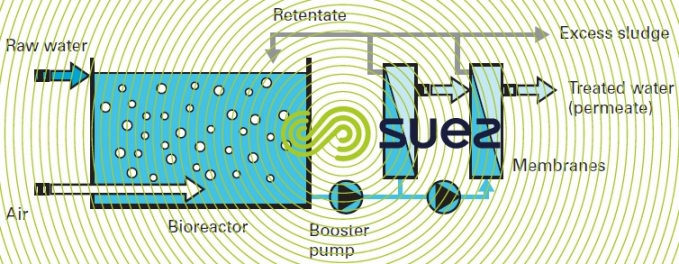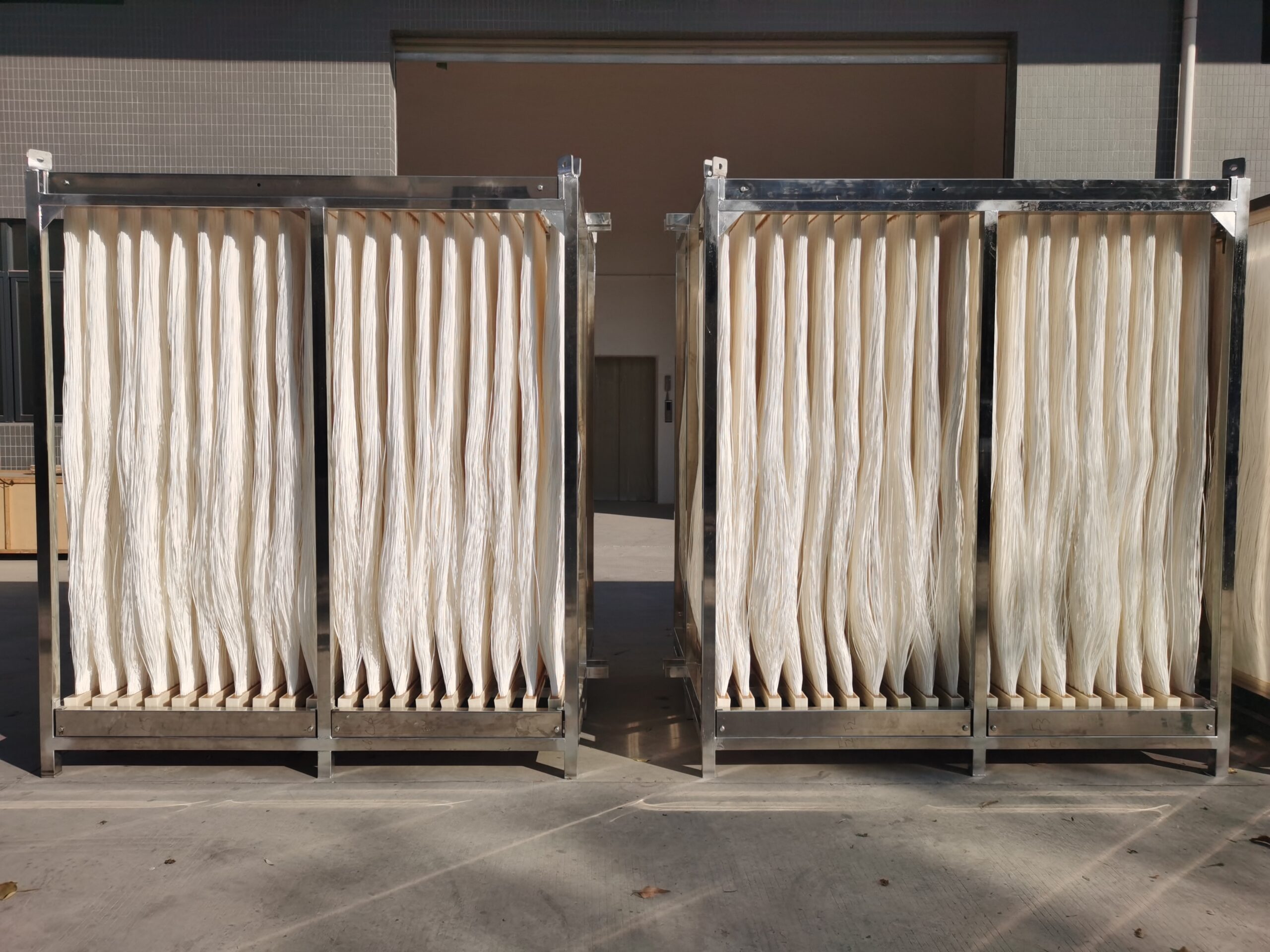The Advantages of Using a Membrane Bioreactor for Efficient Water Purification
The Advantages of Using a Membrane Bioreactor for Efficient Water Purification
Blog Article
Just How Membrane Bioreactors Are Changing Water Purification Equipments
The development of membrane layer bioreactors (MBRs) represents a substantial development in the area of water purification, merging organic treatment procedures with cutting-edge membrane purification technologies. This combination not just improves the top quality of treated effluent however additionally addresses urban area restraints, making MBRs particularly appropriate for largely populated areas. As international water scarcity increases, the duty of MBRs in helping with safe and clean water reuse and lasting water management ends up being significantly critical. The effects of this technology extend beyond effectiveness-- what possibilities and obstacles exist in advance for its widespread implementation?
Overview of Membrane Bioreactors
Membrane bioreactors (MBRs) stand for a substantial development in water filtration technology, as they combine organic treatment procedures with membrane layer filtering. This combination enhances the performance of wastewater therapy by using bacteria to degrade natural contaminants while simultaneously employing semi-permeable membrane layers to separate treated water from put on hold solids and microorganisms.
The MBR system generally contains an organic reactor where the microbial populace metabolizes pollutants, followed by a membrane layer filtering unit that maintains biomass and enables just clean water to pass through. This double functionality causes higher effluent top quality compared to conventional therapy methods. MBRs can be run in both batch and constant flow settings, offering versatility in design and application.
They also allow the recuperation of water for reuse, thus contributing to water sustainability campaigns. Generally, MBRs are at the leading edge of boosting water treatment efficiency and quality, showcasing the possibility for ingenious remedies in environmental management.
Advantages of MBR Innovation
The combination of organic therapy with membrane layer purification supplies numerous advantages for water purification processes. One of the primary benefits of Membrane Bioreactor (MBR) technology is its ability to efficiently eliminate both organic and inorganic contaminants, resulting in premium effluent. The membrane layers function as a physical barrier, stopping suspended solids and microorganisms from going through, which enhances the overall safety and integrity of cured water.
In addition, MBR systems need a smaller footprint contrasted to standard therapy techniques, permitting extra reliable area usage. This compact layout is specifically helpful in urban setups where land is restricted. MBRs likewise demonstrate functional versatility, accommodating differing influent high qualities and flow prices without considerable performance destruction.
Moreover, the process supplies improved nutrient removal capacities, especially for nitrogen and phosphorus, which are crucial for preventing eutrophication in obtaining waters. The decreased sludge manufacturing connected with MBR technology additionally translates to decrease disposal expenses, making it an economical solution over time - Membrane Bioreactor. In general, the benefits of MBR technology placement it as a leading choice for lasting and cutting-edge water filtration systems, dealing with both environmental and financial issues
Applications in Water Filtration
Applications of Membrane Bioreactor (MBR) modern technology in water purification are diverse and impactful, dealing with numerous treatment needs throughout numerous industries. MBRs properly combine biological therapy processes with membrane filtering, making them ideal for community wastewater therapy, commercial effluent management, and even safe and clean water reuse initiatives.
In metropolitan setups, MBRs are increasingly employed to improve the high quality of dealt with wastewater, enabling conformity with rigorous discharge laws and facilitating the recycling of water for irrigation and non-potable uses. Their compact design also makes them suitable for urban environments where space is limited.
Industrially, MBR technology is made use of to deal with procedure water and wastewater, specifically in fields such as food and drink, drugs, and textiles. By efficiently eliminating pollutants and suspended solids, MBRs help industries decrease ecological effects while recuperating useful resources from wastewater streams.
Furthermore, MBRs are gaining grip in decentralized water therapy applications, where small-scale systems can be deployed in remote locations or creating areas. This adaptability enables areas to attain sustainable water management solutions, boosting accessibility to clean water while reducing dependence on standard treatment approaches.
Study and Success Stories

In one more example, a fabric manufacturing facility in Bangladesh embraced MBR technology to resolve its wastewater difficulties. The system reduced chemical oxygen need (COD) levels from 1,200 mg/L to much less than 100 mg/L, therefore meeting regulative standards and dramatically lessening environmental effect.
The University of Cape Community's MBR installation has actually proven reliable this hyperlink in treating greywater for non-potable reuse on school. This project not just conserves drinkable water yet likewise works as an academic version for sustainable techniques.
Furthermore, a fish and shellfish processing plant in Norway used MBR modern technology to treat effluents consisting of high levels of raw material, achieving over 90% contaminant elimination. These study emphasize MBR technology's adaptability and its vital role in improving water top quality across diverse applications.
Future of Water Therapy Solutions
As international water scarcity and contamination obstacles intensify, ingenious water therapy remedies are becoming increasingly vital to ensure sustainable access to clean water. The future of water treatment hinges on the assimilation of innovative technologies that enhance the effectiveness and efficiency of filtration procedures. Membrane layer bioreactors (MBRs) go to the center of this advancement, combining biological treatment with membrane filtration to produce premium effluent appropriate for different applications.

Emerging patterns such as resource recovery from wastewater, consisting of nutrients and find more info power, will certainly even more change treatment centers right into environment-friendly hubs. Moreover, innovations in nanotechnology and membrane layer products guarantee improved performance and long life of purification systems.

Final Thought
Their function in safe and clean water reuse and sustainable water administration highlights their importance in dealing with international water scarcity difficulties. Proceeded research and advancement will certainly better enhance the effectiveness and fostering of MBR technology, guaranteeing a durable future websites for water therapy solutions.
The development of membrane layer bioreactors (MBRs) stands for a substantial advancement in the field of water purification, merging organic therapy procedures with sophisticated membrane filtration innovations. As worldwide water shortage escalates, the role of MBRs in facilitating potable water reuse and sustainable water administration ends up being progressively important. They additionally make it possible for the recuperation of water for reuse, thus adding to water sustainability campaigns.As worldwide water shortage and air pollution difficulties magnify, ingenious water treatment solutions are becoming increasingly vital to make sure lasting access to clean water. Their role in potable water reuse and lasting water monitoring highlights their value in attending to worldwide water shortage challenges.
Report this page